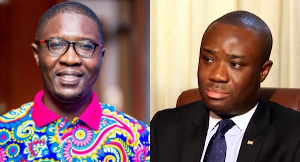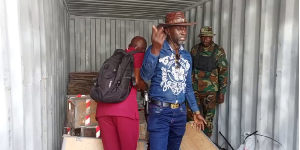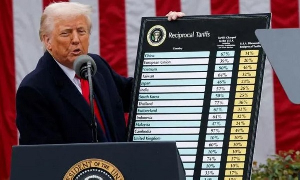Security Capo Mounts Defence for Rawlings
PROFESSOR EBOE Hutchful, Executive Director of African Security Dialogue and Research, has expressed strong reservations at the way some sections of the political divide in the nation are bent of re-writing the history of Ghana by apportioning blames to the former President, Flt. Lt. Jerry John Rawlings in terms of security of the State.According to him credit must be given to whom it was due, saying it was unfortunate that people have resorted in the negatives of the former President after he had helped to restore some dignity into national security.
He said attempts to completely write off Mr. Rawlings and to kill a predecessor king was not right for the nation. "You cannot write him out of history. People must not kill a king that preceded another king for another person to be hailed."
In a jokingly manner but on a serious note, he said, "I have no doubt that when the NDC comes to power, they would like to re-write their own history to praise themselves," he told a parked gathering of learned lawyers, civic society organizations, security experts drawn from Ghana Police, Immigration, Army, Navy and other relevant institutions when he gave a talk on "Democratic Governance of Security; facing up to Ghana's fragility'.
Speaking at the second Ghana Speaks lectures in Accra organized by Joy FM in collaboration with Institute of Democratic Governance (IDEG), Prof. Hutchful, who gave a preliminary praises for the former President and that of President John Agyekum Kufuor for his roles on consolidating the security gains of the former President, said despite the fact of the authoritarian regime of Mr. Rawlings, he managed to establish the National Security Act in 1992.
He said Mr. Rawlings and Captain Kojo Tsikata (Rtd), former National Security Boss have managed to stabilize the State's security. Prof. Hutchful's recommendations did not go down well to two individuals including an Evangelist Patricia Amoah, who quizzed the lead discussant on why J.J should be should be given credit.
They accused the former president of destroying the security set up through coups and counter coups.
But Prof. Hutchful, a security expert maintained that his argument that it would be totally out of place to want to kill a predecessor to the advantage of another.
"I see that Ghana is in conflict position over Rawlings heritage. I said this in a very detailed book and I also see that some Ghanaians have unresolved problem with Rawlings. It is time that we look at the reality of issues and give credit to where credit is due."
Prof. Hutchful, who delved into issues of national security, bemoaned the manner in which things are polarized especially parliamentarians.
He said there was the need to reconsider our partisan positions and work collectively in the security of the nation.
Recounting the establishment of the National Security Act 526, he noted that Ghana is rated among the best African countries in terms of security.
Dr. Emmanuel Akwetey, Executive Director of IDEG said, "While the primary security threat in the past emanated from a single in the form of coups d'etats, current threats are from much more decentralized, diffuse, overarching and dangerous sources, including the proliferation of conflicts and small arms in the sub-region, incidents of armed robbery, narco-trafficking, terrorism, HIV/AIDS, natural disasters, economic shocks etc."
According to him, a presentation suggested that democratic consolidation is unlikely to occur without addressing these problems.
"Indeed Ghana today is in a uniquely favourable position to tackle these challenges, given appropriate political will."
In a released signed on his behalf by Prof. Kwame a Ninson, head of Research And Information Unit, Dr. Akwetey observed that the nation' security management is however flawed by a number of challenges.
The challenges he mentioned included contradictory and largely obsolete legal frame work, weak governance mechanisms, in the security sector, low level of public interest in and engagement with security issues and absence of a policy frame work in the security sector.
However he noted that, "Ghana has recently shown a remarkable progress in terms of political stability and quality of governance. Improvements have occurred also in the quality of the security environment."
To him, there is now protection of basic individual liberties and greater transparency around security matters, adding that the state and its security institutions are no longer seen as agents of insecurity to Ghanaian citizens.
On his part, former national Security who served as the chairman for the occasion, Mr. Kofi Bentum Quantson, said the abrasive pursuit of the politics of expediency that flaunts the philosophy that the end justifies the means with scant regard for the socio-political consequences must not be entertained.
"A laissez-faire political expediency strategy can severely undermine good democratic practice and eventually threaten national security. Especially when the ends are determined in a selfish dubious context that may be miles away from the overall national interest," he said, adding that anybody who, or anything, which undermines the national interest, should be broadly classified as a national security threat. "National interest here should be interpreted as the quality survival of the people."
Mr. Bentum, who stated his opening remarks that he would be flogging the obvious if he should repeat that security is a cardinal requirement for the survival and wellbeing of humankind; or that without security there can be no development or progress; or that without progress life on planet earth would stagnate into a dangerous mess, said, "But I should, because security in any form, manifestation or dimension- whether as global security, national security, human security, social security, food security, ecological security, even cosmic security- should be appreciated and religiously observed as a way of life and an inseparable companion.'
According to him unfortunately current situations are giving different dimensions. "In many situations, you mention security and images of harassment, torture, imprisonment, terror and so on are conjured. Even security personnel can be despised with venom. That is unfortunate."
One reason he said ought to be dealt with politicians, he said, "One reason has to do with the way politicians, governments and powerful people with influential connections, have misused, abused or bastardized institutions established to protect the people, to protect their own parochial interests, incompatible with, or actually inimical to the national interest."
Mr. Bentum, avers further that another problem in his view has to do with the rather thorny issue of how much of security should be applied in any given situation, to achieve the optimum objective, in a manner that does not jeopardize the human rights and civil liberties of the people. "That fine balance has not been easy to maintain, especially in the volatile and crazy world of ours, where some people seem to derive psychopathic satisfaction in perpetuating sophisticated organized and brutal lawlessness that often defies reason and when measures to deal with these situations could result in more devastating insecurities."
He continued, " Indeed all over the world, governments and civil society groups have been battling this. The issue could be further aggravated when civil society finds itself compromised or emasculated to the extent that it abdicates the supreme obligation of defending the national interest."
The former security boss stated further that his experience as a security boss indicated that, "oftentimes the managers of national security are confronted with unpleasant paradoxes or uncomfortable dilemmas especially when it becomes apparent that the authorities themselves are, by their actions or inactions, promoting or creating security tensions."
"A ludicrous twist develops when they refuse to locate the problem in themselves, and instead, blame their adversaries, real or imagined. I expect that you recognize this "blame-game" attitude as regrettably chronic characteristics of our political.












